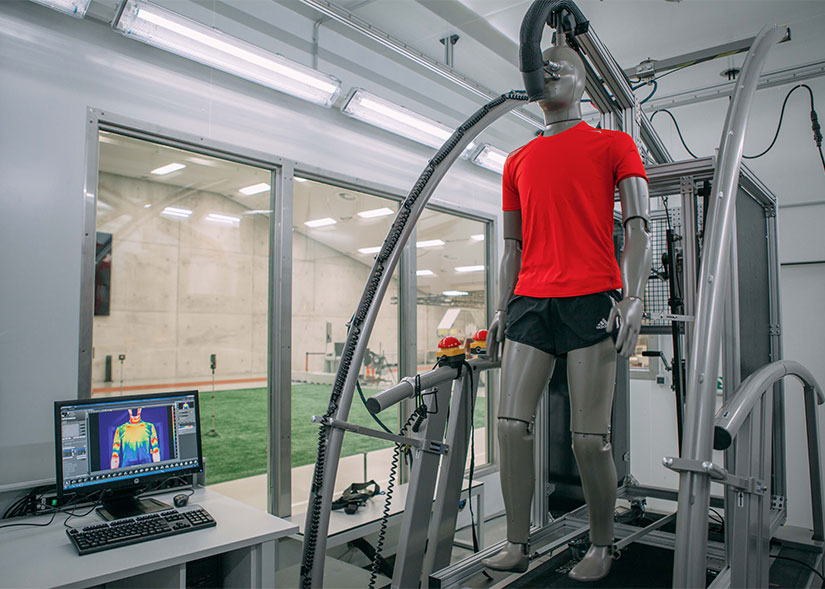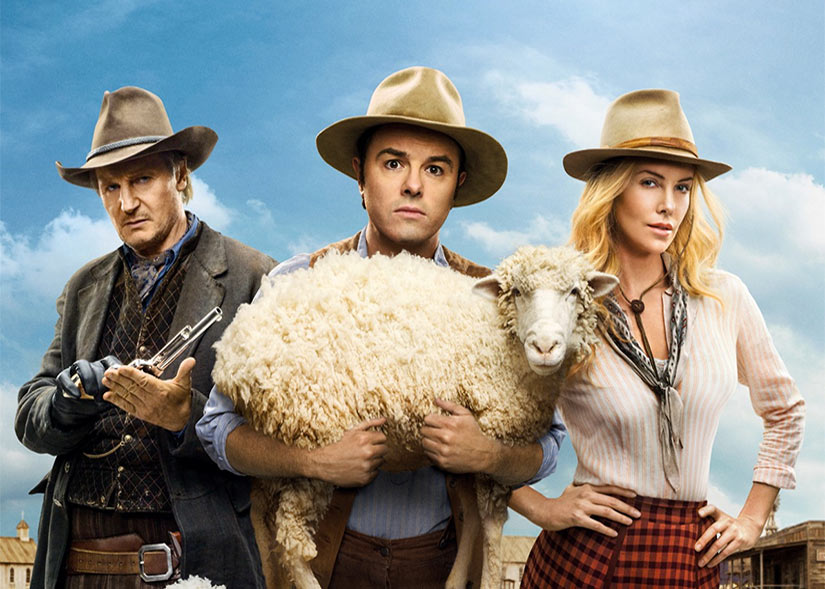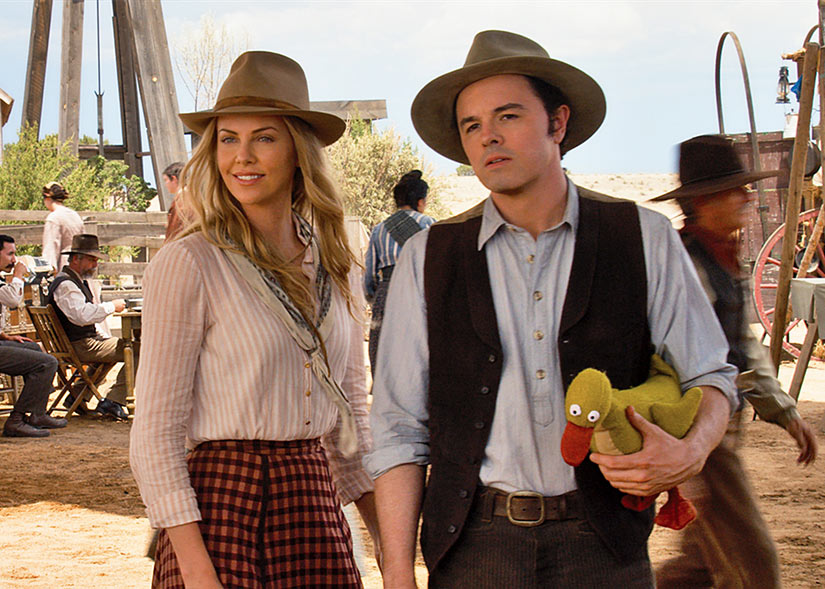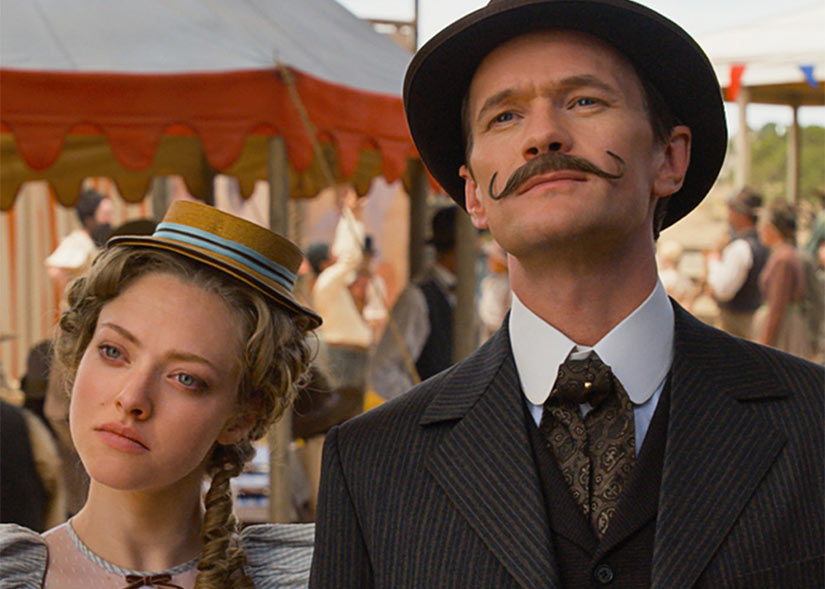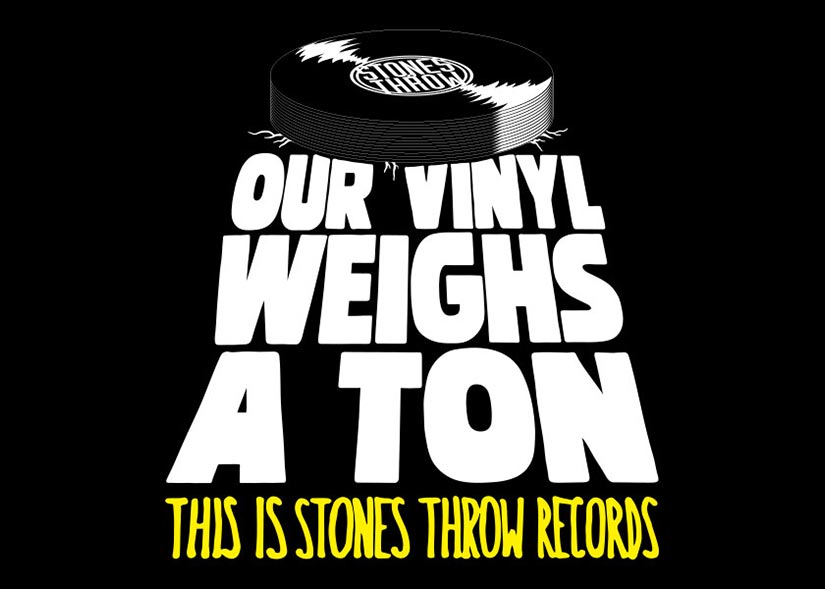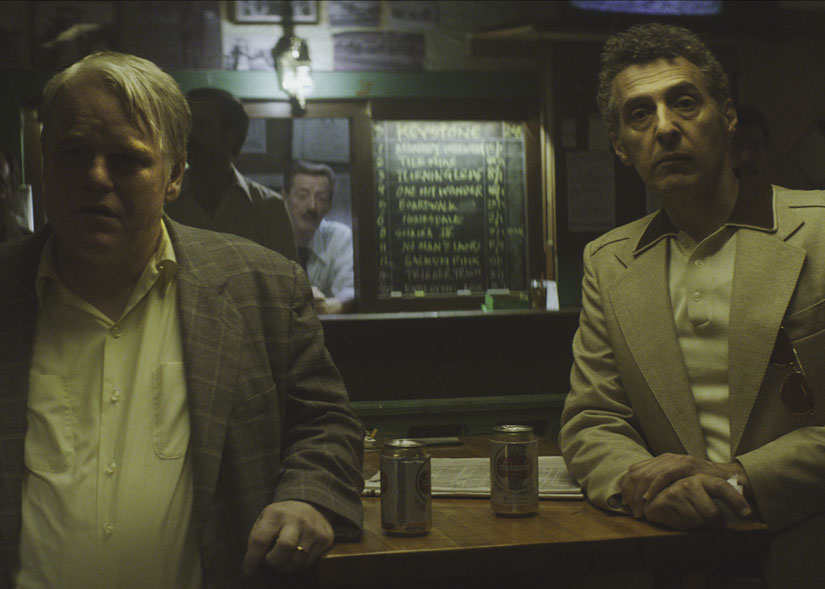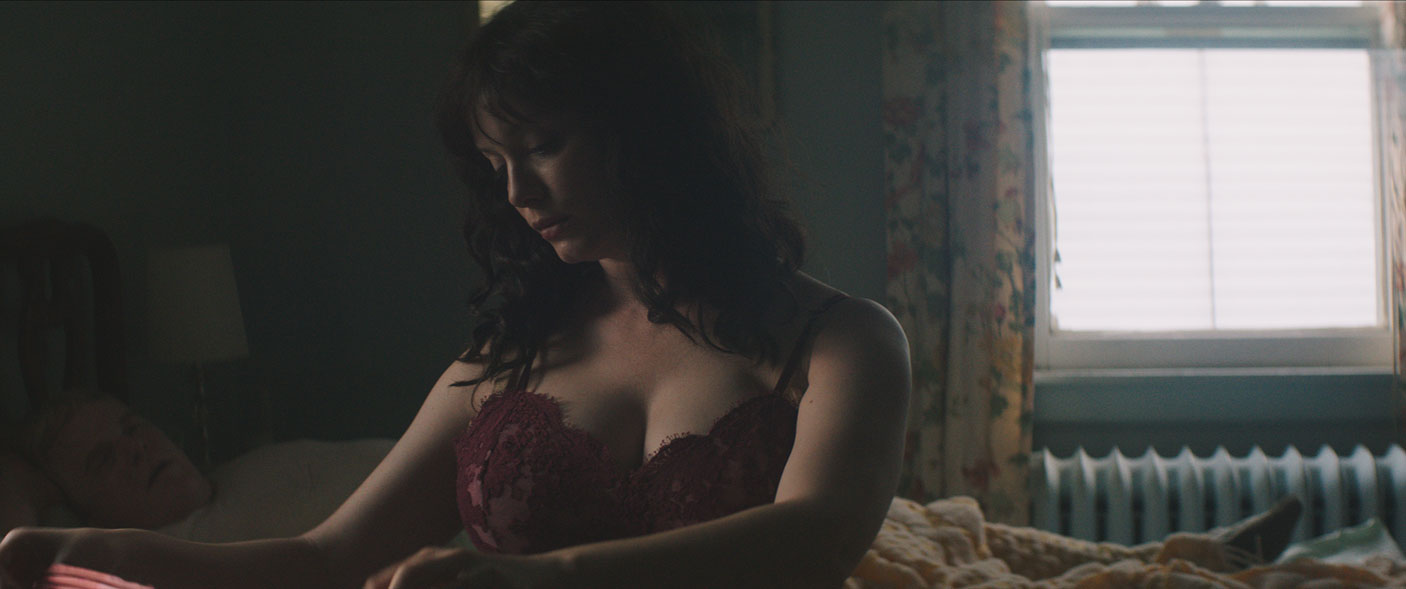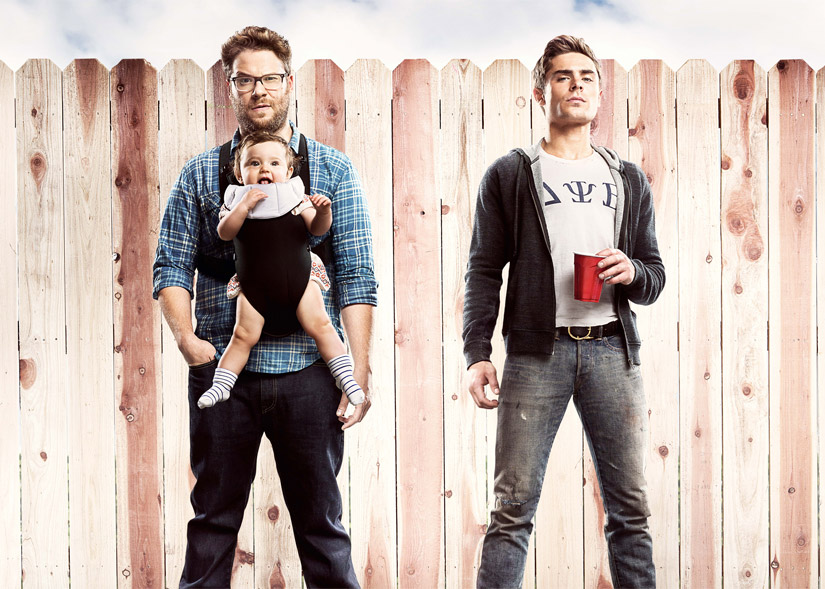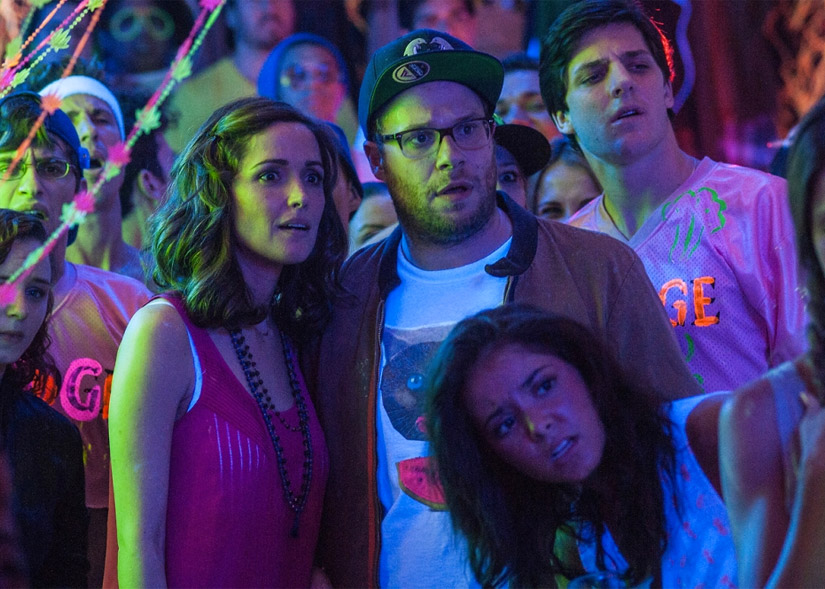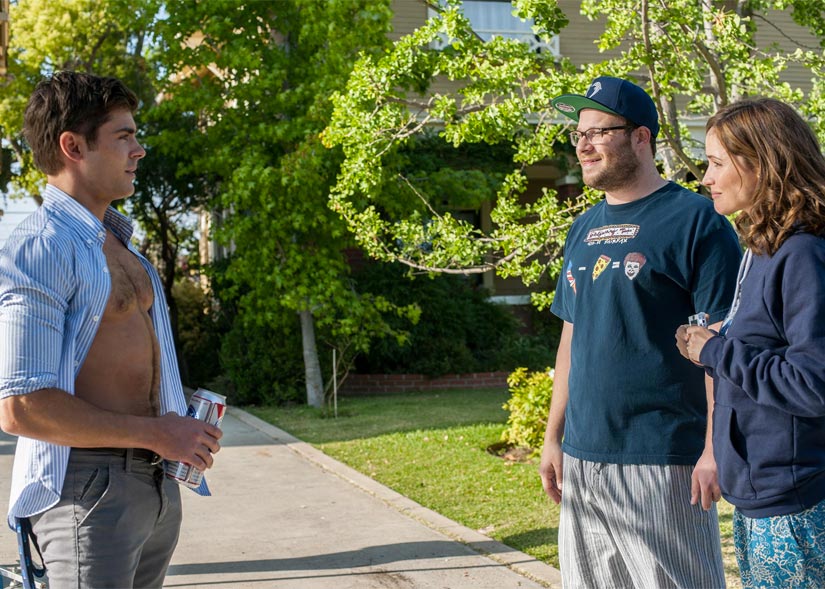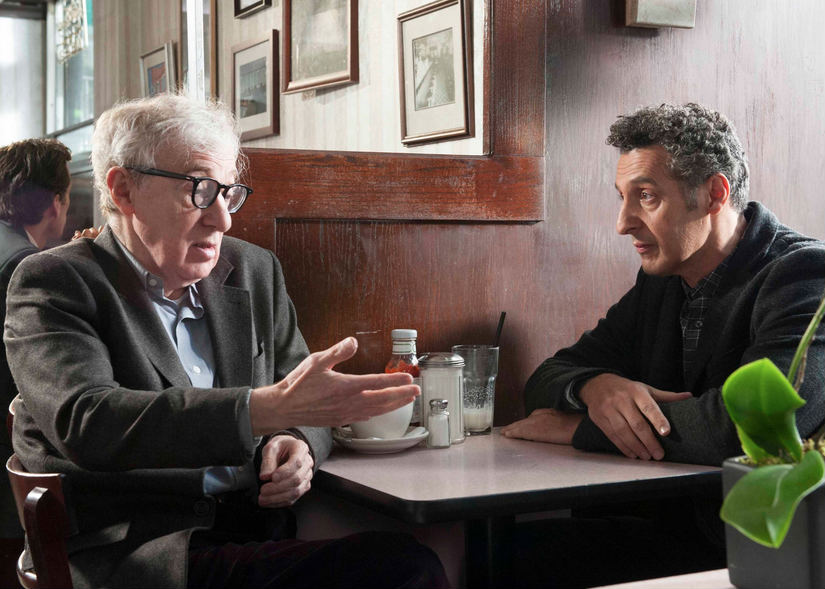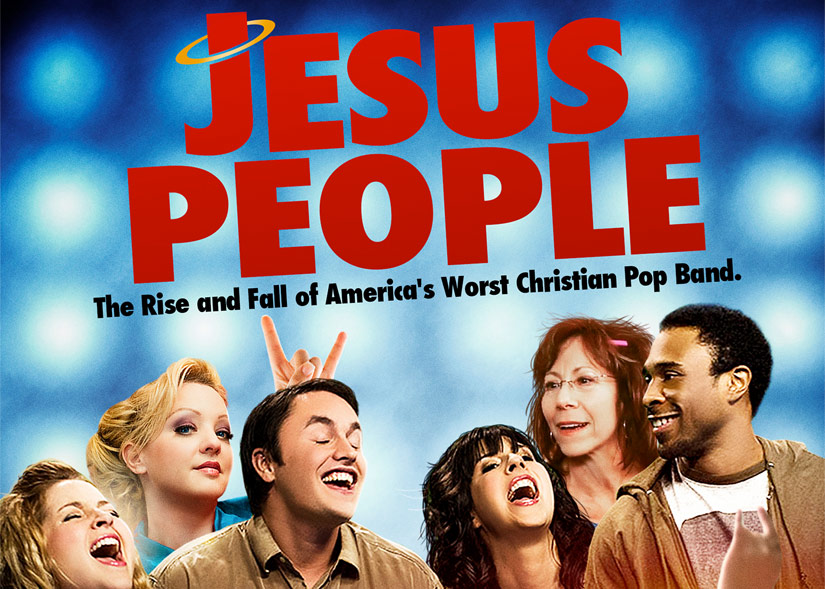[Review] The Next Black
The Next Black introduces us to the Brave New World of fashion, placing the garment industry in a futuristic context that most of us growing up with stores like H&M or Zara never thought would be possible. The documentary comes at the viewer in a minimalist, straight-forward and tsunami-like manner, similarly to the clothing industry itself, which holds promises of one day wearing the surface of computers- washable tech, soft tech, and silky tech - on our bodies.
The documentary opens up by explaining that textiles today still cover bodies and indicate social code. However, fusing fashion and technology introduces us to a drastic transformation in textiles- to a machine that alters the way we dress, or a factory disguised as a garment. While this idea seems too cyborg-like or OD science fiction for some, wearable tech is going to make its way to the market sooner or later, and scientists collaborating with designers are ready to tackle the breakthrough. While few interviewees are featured in this documentary, each is an expert in his or her field, and effectively hits viewers with numerous facts about the quickly transforming world of fashion.
[youtube id="VuPzdpudwhU"]
The Next Black
Director: Phil Marthinsen
Rating: N/A
Release Date: June 3, 2014 (VOD)
The New Black brings to the table the concept of smart clothing. In Germany, Adidas has figured out how to monitor athletes’ performance using real time, equipping their clothing with heart rate sensors and working on adding respiration sensors and other features. Elite sportswear is still in the “bacteria” stage, as is most wearable tech, and is focused on developing smaller, faster, and smarter platforms. The concept of bacteria is also introduced to the viewer in a more literal and concrete way, with The New Black suggesting that innovations can take textiles to the next level by embracing nature and growing a dress in a vat of liquid using microorganisms. This process is described as being much closer to brewing beer or baking than one of fashion, but can move efficiently from the lab to the market and also reduce waste. It opens up a broad range of possibilities for what fashion will be able to do for us in the future, potentially being able to protect our skin or even provide us with nutrients.
Almost more important than introducing possibilities stemming from the fusion of science, technology, and fashion, the documentary calls out the concept of “fast fashion,” which is fashion that’s mass-produced, has a fixed price, and is standardly sized. We often blame unethical brands and polluting factories for fast fashion dominating our culture, but The Next Black stresses that the most important shift in textiles rides on the shoulders of consumers, who critically need to come to terms with their place in the garment industry. It’s important for us to be cognizant of the fact that relentless production and consumption stems from companies needing to satisfy our ever-changing desires and needs. Change derives from buying less clothing, but also from caring about the clothes we already own. By being proactive with what we wear, we become proactive with our product, and the tangible experience allows us to develop a more emotional connection with clothing, changing the future of fashion on both an intimate and a grand scale.
The Next Black gives us this sneak peak into what the future holds for fashion in a fitting minimalistic and informative manner, especially considering how dense the reality of tech innovation is for generations growing up deciphering dial-up Internet. Going from having dial-up to having potentially digital skin is not a concept that can be taken lightly, especially by an age group that is still the beta for such drastic changes. While the synthesis of textiles, innovative technology and science offers what seems to be hopeful change in the world where fashion meets futuristic function, such extreme transformations call for a large amount of unknowns. We must be on our game as consumers to avoid being passive with these shifts, in order to enter this Brave New World on alert and fully guarded.
[Review] A Million Ways to Die in the West
Seth MacFarlane made a name for himself with his various TV outings, practically single-handedly overtaking Fox's Sunday night TV programming with Family Guy, American Dad!, and The Cleveland Show. While each show has its fans, the "MacFarlane" brand of humor has, at times, run long in the tooth. What was once edgy and a legitimate alternative to The Simpsons (paired with the show's decline in quality over recent years) became stale, uninteresting, and too sophomoric for its own good.
2012's Ted, MacFarlane's film debut, was a test to see whether or not the writer/director/actor's brand of humor could translate not only to a live-action setting, but also sustain a feature length film. Almost $550m and generally positive reviews later, the answer was yes. To follow up, MacFarlane's comedy/western A Million Ways to Die in the West is grounded as much to reality as a MacFarlane project can be. However, did luck strike twice for MacFarlane, or did A Million Ways to Die in the West suffer the sophomore slump?
[youtube id="QG4rSUpB8RA"]
A Million Ways to Die in the West
Director: Seth MacFarlane
Rating: R
Release Date: May 30, 2014
Albert Stark (Seth MacFarlane) is a sheep farmer living in 19th Century Arizona where there are "a million ways to die." Out of the myriad ways in which people can die, one of the most common ways is during a duel. Rather than face another man in a duel, he withdraws, causing his girlfriend, Louise (Amanda Seyfried), to leave him for another man, the mustachioed Foy (Neil Patrick Harris). Down on his luck, he befriends a new woman in town, Anna (Charlize Theron).
While their friendship begins as Albert uses her to make Louise jealous and to increase his masculinity, the two inevitably fall in love with one another. Unbeknownst to Albert, however, is that Anna is married to Clinch Leatherwood (Liam Neeson), the most notorious gunslinger in the West. When Clinch discovers Anna has been galavanting around town with another man, Albert must do what he can to survive an encounter with him or else face a gruesome death.
As a fan of Seth MacFarlane, I say this as bluntly as possible: MacFarlane's work is very gimmicky and one-note: Ted featured a talking teddy bear, Family Guy lampoons the dimwitted husband/nuclear family thematic, American Dad! follows a Conservative paternal figure, etc. A Million Ways to Die in the West beats its audiences over the head with the characters' awareness to its setting. Sometimes, the jokes work; often, they don't. While some of the perilous dangers that the film's characters face are humorous, they're really nothing more than forgettable sight gags. However, that's not to say that there aren't real jokes in the film; far from it. Rather, you'll more than likely end up chuckling over the occasional joke rather than gasping for air. There's a lot of toilet humor (both literally and figuratively) in A Million Ways to Die in the West, so if you're into poop and pee jokes, you're in luck.
Whereas Ted felt like a natural progression from MacFarlane's Family Guy, A Million Ways to Die in the West feels like nothing more than a long episode set in the 19th Century West. The soundtrack will sound familiar to Family Guy fans, as the showtunes-esque score is very akin to the one MacFarlane uses on the show. There's even a long musical number that was one of the highlights of the film, thanks to the participation from Harris. In fact, if there could only be one highlight for the film, it's the stellar cast that MacFarlane put together.
While MacFarlane makes for a promising lead, his performance shows promise for future films, but doesn't quite hit the highs you expect. Thankfully, the ensemble cast more than does its part to keep the film afloat. The supporting cast of Sarah Silverman, Harris, Neeson, and Giovanni Ribisi are enough to bolster MacFarlane's subpar performance. Naturally, every scene in which Harris' Foye plays a primary role steals the spotlight away from any other character, whether it's from the aforementioned musical number, his character's subtle quirks and ticks, or his sense of physical comedy. To a slightly lesser degree, Silverman's naive Rose, a prostitute, allows MacFarlane a natural way to punch in edgy sex jokes; what would a MacFarlane project be without a handful of semen jokes, anyways?
A Million Ways to Die in the West showed promise with its early trailers. However, it really is nothing more than a long wild, wild West-set episode of Family Guy. It has its moments, and the supporting cast brings in as much as they can, but the film doesn't bring as many laughs as you'd like. Sure, you'll get the mustache song stuck in your head, you'll never be able to look at Neil Patrick Harris the same again, and you'll geek out with your friends over the pop culture easter eggs MacFarlane threw into the film, but they don't add up enough to cover an otherwise disappointing experience. Ultimately, A Million Ways to Die in the West isn't able to escape the one-note joke of its setting. However, there's enough present in the film to keep expectations positive for MacFarlane's next film, whenever that may come about.
[Review] Our Vinyl Weighs a Ton
Every influential movement always comes from humble beginnings. Formed in 1996 as simply a means to release a memorable, emotionally important album between two friends, Stones Throw Records has established a cult following for its catalog of classic, independent hip hop (and in more recent years, experimental indie). In Our Vinyl Weighs a Ton, director Jeff Broadway tracks the history of Stones Throw and its founder, Peanut Butter Wolf (nee Chris Manak), over its near 20-year history in a well-packaged documentary that will attract the most ardent of Stones Throw fans.
[youtube id="rwZVV_77MhM"]
Our Vinyl Weighs a Ton
Director: Jeff Broadway
Rating: N/A
Release Date: May 27, 2014 (VOD - Purchase Here)
Our Vinyl Weighs a Ton begins with a young Chris Manak, the San Jose-based DJ/producer who would eventually become Peanut Butter Wolf and introduces some of Manak’s childhood friends that would play huge roles in the formation of Stones Throw, namely Jeff Jank, Baron Zen, and Charizma. Following the untimely death of Charizma in the documentary’s narrative, Our Vinyl Weighs a Ton jumps around in time to highlight major moments in Stones Throw’s history with very defined chapter breaks.
The documentary is bolstered not only by interviews with current and former Stones Throw artists, but also by artists that were influenced by or fans of the record label, including ?uestlove, Earl Sweatshirt, and Kanye West. While it’s great to have heavy-hitting stars share their thoughts, it would have been nice to see reactions and testimonies from fans, as well. Also included in the documentary are archival footage featuring never-before-seen videos of Peanut Butter Wolf and Charizma during the early '90s, videos from the studio including Madlib and J Dilla's first meeting, and more. The historical goodies are what will attract long-time Stones Throw fans, as well as the soundtrack featuring new tracks from Madlib himself.
Our Vinyl Weighs a Ton, in a way, follows the same ethos Manak does for Stones Throw. Towards the end of the documentary, Manak says, "there's probably three or four handfuls of people who, when I put out a record, I want them to like it. Beyond that, I don't care." In essence, Our Vinyl Weighs a Ton caters to Stones Throw fans; they're the circle that will get the most out of this documentary. However, the entire package is put together so well (and entertainingly so), that it'll capture interest from those with a cursory familiarity with the label. If you consider yourself a fan of independent hip hop, Our Vinyl Weighs a Ton isn't necessarily a must-see, but definitely a documentary worth catching when you come across it.
[Review] God's Pocket
[This review was originally published as part of our SXSW 2014 coverage. It is being re-posted to coincide with God's Pocket's theatrical release.]
God's Pocket
Director: John Slattery
Rating: N/A
Release Date: January 17, 2014 (Sundance)
Dark comedies sometimes appear to be the easiest genre to work in. They can be gruesome, violent, brutal, unforgiving, eye-opening, over-the-top, exaggerated, complete satires of a film that, for better or worse, get a bit of a pass due to its branding. Is this lazy? Perhaps. When done right, we get films like Pulp Fiction and Reservoir Dogs. Mishandled, however, and the result is like the endless amount of straight-to-DVD films that have followed in Vincent and Jules' wake.
With his feature length directorial debut, John Slattery (Mad Men's Roger Sterling) delivers God's Pocket, a neighborhood-driven film in which an assortment of pratfalls present conflicts to the characters in precarious manners. Which side of the "dark comedy" spectrum does God's Pocket fall on? Read on and find out.
Mickey (Philip Seymour Hoffman) is a God's Pocket transplant, a small neighborhood in Philadelphia where the natives stay native generation to generation. He runs small-time jobs with his friend (John Turturro) for a mob-esque figure, his wife, Jeannie (Christina Hendricks), doesn't care much for him, and his step-son, Leon (Caleb Landry Jones), is a racist pig. When an altercation at Leon's job leaves him dead, Jeannie's Motherly intuition suspects something is amiss. While Mickey turns to his mob friends for help, a famed local reporter (and heavy alcoholic), Richard Shelburn (Richard Jenkins) takes it upon himself to discover the truth... and much more.
The focus of the film isn't so much on Leon's death, but on the various characters residing in God's Pocket. Everybody from the funeral director (Eddie Marsan) to the local barkeep portray not characters, but caricatures that play into the overall plot... for better or worse. The problem is that, outside of Hoffman and Turturro, every character is a gimmick, an empty shell lacking real personality or character. The tone of the film shifts between a dark comedy and a psuedo-noir genre, but isn't able to find its identity. It's unfortunate, too, because Hoffman's performance in God's Pocket is great in spite of the uneven writing.
[Review] Neighbors
[This review was originally published as part of our SXSW 2014 coverage. It is being re-posted to coincide with Neighbors' theatrical release.]
[youtube id="wyH9PLLLPaw"]
Neighbors
Director: Nicholas Stoller
Rating: R
Release Date: March 8, 2014 (SXSW)
Nicholas Stoller has been making a name for himself in the comedy scene for years, writing and directing some decent comedies (Forgetting Sarah Marshall, The Five-Year Engagement). Neighbors, his most recent feature, takes some of the best parts of any Judd Apatow-related film, but adds in Stoller's own style that makes it one of 2014's best comedies of the year thus far.
Mac (Seth Rogen) and Kelly (Rose Byrne) are two young parents that move into a brand new neighborhood after putting their life savings into a house. Everything seems well and idyllic until a fraternity moves into the building right next door. Wanting to get on their good side, Mac and Kelly introduce themselves to the fraternity's two leads, Teddy (Zac Efron) and Pete (Dave Franco). After hitting things off well, the relationship between them quickly sours after Mac and Kelly call in a noise complaint. Feeling betrayed, the fraternity declare a war of pranks and shenanigans on the couple, creating chaos in an already chaotic life. With no real options left to them, Mac and Kelly must fight fire with fire to ensure they aren't displaced from their own neighborhood.
Neighbors takes a simple premise and runs with it to great comedic effect. What could have been nothing but a raunchy, lightweight comedy ended up being one of the year's early comedy hits. Considering the nature of the premise (fraternity vs. developmentally-arrested young parents), the raunch level was always going to be present. However, it's used in good taste and contextually well within the frameworks of the film. For example, most college-themed films like to include as many topless girls as possible to give off the "college" feeling. Neighbors, however, keeps the breasts to a bare minimum, only turning to them when appropriate or for a well-placed joke, essentially empowering the importance of bare breasts to great effect.
One major slight against Neighbors is a pacing problem. While the film starts off with some great jokes and keeps the momentum going, there's a noticeable section of the film where the jokes and setups are halted for an extended period of time. Within the context of the film, this was all meant to lead into the otherwise hilarious third act, which is understandable, but unfortunately too much of a lapse to easily brush aside. When the jokes are on, though, they're on, whether it's extended "Who's the real Batman?" exchange, dildo molding, or a long breast milk gag.
Everybody in the cast brought their A-game to Neighbors. Zac Efron's been on this high trajectory, and I was happy to see him get the chance to work alongside both Stoller and Rogen. Franco, too, needs more roles like his in Neighbors, not only because of his comedic prowess, but to also show what he can offer outside of older brother James' shadow. Of course, Byrne stole the show with her jokes. It just be the accent, but Byrne was on it for Neighbors, perhaps building off of the great chemistry she and Rogen shared.
Neighbors won't be out in domestic theaters until May 9th, and indeed, the SXSW cut of the film still was an unfinished one, needing some extra polish, sound mixing, and overall post-editing. Hopefully, the edits they make can help the aforementioned lull in pacing towards the end of the film, plus cutting a few jokes or two wouldn't be a bad idea (including a gruesomely unnecessary Obama joke that didn't land at all). However, despite the extra work that'll be made on the film, I still stand my ground by labeling Neighbors one of 2014's best comedy offerings.
[Review] Chef
[This review was originally published as part of our SXSW 2014 coverage. It is being re-posted to coincide with Chef's theatrical release.]
Chef
Director: Jon Favreau
Rating: N/A
Release Date: March 7, 2014 (SXSW)
Over the past few years, director Jon Favreau has been known for his big budget sci-fi films (Iron Man, Iron Man 2, Cowboys & Aliens). However, his career began with earnest in low budget indie darling films, most notably Swingers alongside Vince Vaughn. Since then, Favreau's trajectory has skyrocketed, culminating with the aforementioned Iron Man films, which themselves helped establish Marvel's dominance in the film industry. However, wanting to create something personal on a smaller scale, Favreau brought Chef to this year's SXSW in which he directed, wrote, and starred. Would all of the years spent working on big budget Hollywood films affect his ability to create films that were driven more by personal stories than grandiose concepts? Read on and find out.
Early in his career, chef Carl Casper (Favreau) was named one of the most exciting chefs in the restaurant business. After establishing a residency at a Los Angeles restaurant for many years, Casper's creativity began to suffer. In an attempt to reinvigorate both himself and his cooking staff, he set out to create a special menu to accommodate LA's most notorious food critic. However, the owner of the restaurant (Dustin Hoffman) prevents Casper from deviating from the established menu, resulting in a domino effect of events that lead to a scathing review of Casper's talents and his own ouster from the restaurant. With his future prospects out the window, Casper sets out to Miami to start a food truck business with his best friend and former line cook (John Leguizamo). Also along for the ride is Casper's son, Percy (Emjay Anthony) who had been inadvertently ignored due to Casper's busy schedule and the divorce between he and his ex-wife (Sofia Vergara).
Chef is split by its two halves. The first half of the film focuses on Casper and his professional fall and rise. The conflict is driven not just by the obvious man vs. man conflict, but also man vs. self as Casper has to re-adapt his life and find what's been missing inn his personal and professional careers. The second half focuses more on Percy and his reconnection with Casper. The transition from the light comedy/drama of the first half to the road trip/buddy film in the second half was a bit rough, but welcome at the same time.
In a way, Chef is simple, and that's okay. Much like Favreau's Casper went on a journey to find the spark he once lost, Chef could be Favreau's proverbial food truck. It won't be for everybody, and some might expect more from the writer/director/actor, especially with the film being his first feature since the Hollywood film predecessors. The drama's light and nothing too expository, but the true heart of the film is in the comedy. Favreau's writing is pointed and direct in its nature, relative to both the restaurant industry and the Latino flavor of the film. Complementing the Latin tone of the film is the spectacular soundtrack that features covers of notable songs from Merengue to Salsa to Bachata and everything in between.
Chef is a light, good-hearted film that definitely benefited from being SXSW's opening film. It's charming, has jokes that are actually funny, and is supported by a great cast. If you're looking for a laid-back night out, Chef will be the perfect complement to a nice, candlelit dinner.
[Review] Fading Gigolo
When I write my reviews, I feel as if it seems like I hate most romantic movies. However, that definitely isn’t true; rather I had yet the opportunity to see something recent and noteworthy in this genre. Without a doubt there remains a very simple essence to these kinds of films, and I dread the kind of movies that drag out the predictable end. I am a firm believer that good cinema exists in every genre. It’s only by those who can challenge the normal standards who will find progression. Fading Gigolo, with John Turturro and Woody Allen, maybe follows somewhat of a formula, but each scene describes the essence of just what it’s like to find your soulmate with the utilization of original thought and idea.
[youtube id="t2epX4tXfic"]
Fading Gigolo
Director: John Turturro
Rating: R
Release Date: April 18, 2014
Fiorvante (Turturro) agrees to becoming quite the Don Juan due to his lack of financial sources after Murray (Allen), who is also an older man was just looking for a bit of cash. The attraction of women into this industry was simple enough with the charm of a few of Woody’s kind words, and his capability to get them to tell their darkest desires put him in line to be Fiorvante’s own “manager” or “pimp” of sorts. Like most things, though, money can’t buy a person love, and the pair finds themselves caught in between the cross fire of both the desire for money and love.
I thought this movie was absolutely beautiful. Turturro nailed every little detail about the film. A movie full of sex, lust, and love, it seemed only appropriate that the cinematography be utilized in order to keep the overall color of the film a sensual, sunset-like tone. And the soundtrack was perfect as well, for each song properly captured that optimistic feeling of the fall and dating around in New York City. The acting was impeccable as well. Woody Allen and John Turturros’ characters just bounce off of each other with an undeniable chemistry, where as the females in the film (Vanessa Paradis, Sharon Stone, and Sofia Vergara) have a fantastic delivery of their roles as well. I think that the film took the essence of something so seemingly simple and made it its own with such ease, and it’s hard to not like the slight charm throughout.
As much as I loved this movie, there are a few things that could use a few improvements. The biggest issue I noticed, however, was the seemingly abrupt ending. Now, I have no intention on spoiling it, but the final minutes of the film were the least expected. Sometimes surprise is nice, but little to no support as to why Turturro chose to end it how he did left a lot of viewers, including myself, wondering why he went down the route that he did. All of this aside, I think that the filmmaker’s project has evolved into something that can be remembered well by all of those who get the chance to see it.
[Review] Jesus People
I both love and hate the mockumentary format in film (and TV). Shows like The Office and Parks and Recreation can take the simple concept of a TV crew working as tangible, off-screen characters to capture these characters' intimate moments in a believable way. Of course, the presence of these minor characters can lead to funny moments when characters break the fourth wall to acknowledge the insanity (The Office's Jim being the most popular example).
However, the style of the mockumentary can also end up being a mixed bag, having too much in common with the overused found footage genre. In a way, the mockumentary is to comedies what found footage is to horror - when it works, it's on point, but when it fails, it feels lazy and uninspired. Where does Jesus People fall? Read on and find out.
[vimeo id="82323367"]
Jesus People
Director: Jason Naumann
Rating: N/A
Release Date: April 11, 2014 (limited release)
Fearing that he's losing his son Eli (Chris Fennessy) to the secular world, Pastor Jerry (Joel McCrary) is desperate to re-connect with him before it's too late. However, "too late" may not be late enough after a vague medical diagnosis sounds severe. Pastor Jerry, fearing his death is fast approaching, attempts to reach out to Eli by forming a Christian pop band, Cross My Heart. After tapping former popular Christian singer Gloria Hamming (Edi Patterson), church member Zak Crowning (Damon Pfaff), beauty pageant winner Cara Bosch (Lindsay Stidham), and dedicated youth group teacher Ty Raney (Richard Pierre-Louis), the band records their first single, "Save the World." When the song grows bigger than any of them imagined, it signals the dissolution of the band just as they were growing big.
The slant behind Jesus People is the hilarity and sometimes conflicting existences of Christian bands. On the one hand, they find success in Christian radio, but the limiting scope isn't enough for what they want to achieve. When they release a "secular" remix of the song, it shoots up the Top 40 list, but alienates their Christian base. A lot of the humor comes from this controversy where some of the band members aren't Christian, just playing the part for the means of success. Religion is a touchy subject, especially in the form of a comedy, but Jesus People doesn't lampoon the religion in a negative way, which was pretty surprising, considering what the film's about.
The mockumentary style of shooting also benefits the film's nature. Ty is Jesus People's "Jim," constantly turning to off-screen director Jodi (Nikki Boyer) for assistance or assurance that the banality of some of the group's discussions is, in fact, real. The breaking of the fourth wall, within the context of the documentary, is also a sly way for Pierre-Louis to look directly at the viewer for that same reaction; usually, this would be cheesy and an all-too-easy way of poking fun at the film for a quick laugh, but it works in Jesus People.
The narrative itself isn't all too exciting, never outgrowing past the concept of "Hey, let's film a mockumentary about a Christian pop band," but the novelty of exactly that (a mockumentary about a Christian pop band) is enough to warrant a look at the film. Characters, albeit one-note and shallow, do at least experience a full arc, with no one character outweighing another, both in terms of character development and screen time. The issue, however, is that it's just not that funny. There are moments where you'll chuckle over a cute line or scene, but it never warrants a real laugh out loud reaction.

